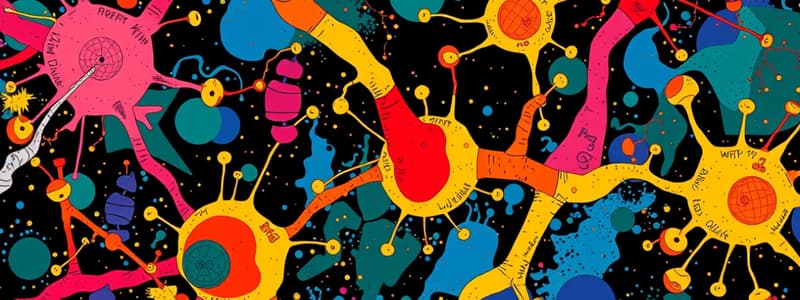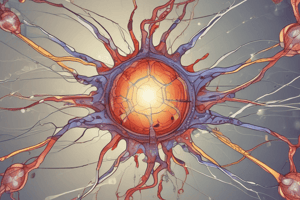Podcast
Questions and Answers
Which neurotransmitter is responsible for activating the fight or flight response?
Which neurotransmitter is responsible for activating the fight or flight response?
- Norepinephrine (correct)
- Dopamine
- Serotonin
- Acetylcholine
What is the primary action of Pyridostigmine in the treatment of myasthenia gravis?
What is the primary action of Pyridostigmine in the treatment of myasthenia gravis?
- Inhibits acetylcholinesterase (correct)
- Enhances dopamine synthesis
- Acts as a muscle relaxant
- Stimulates adrenergic receptors
What is the therapeutic use of Donepezil?
What is the therapeutic use of Donepezil?
- Antihistamine effect
- Parkinson's disease treatment
- Alzheimer's disease treatment (correct)
- Hypertension management
Which medication is indicated for the treatment of irritable bowel syndrome (IBS)?
Which medication is indicated for the treatment of irritable bowel syndrome (IBS)?
What is the mechanism of action of Doxazosin in clinical use?
What is the mechanism of action of Doxazosin in clinical use?
What is the therapeutic use of anti cholinergic medications in the GI tract?
What is the therapeutic use of anti cholinergic medications in the GI tract?
Which medication is specifically used to manage cardiogenic shock?
Which medication is specifically used to manage cardiogenic shock?
Which class of drugs is used to treat Parkinson's disease symptoms and extra-pyramidal side effects?
Which class of drugs is used to treat Parkinson's disease symptoms and extra-pyramidal side effects?
What is the mechanism of action of Pyridostigmine?
What is the mechanism of action of Pyridostigmine?
Which type of shock is characterized by significant blood loss?
Which type of shock is characterized by significant blood loss?
What is a common side effect of Epinephrine administration?
What is a common side effect of Epinephrine administration?
What type of drug is Atropine classified as?
What type of drug is Atropine classified as?
Which medication is an antidote for anticholinesterase poisoning?
Which medication is an antidote for anticholinesterase poisoning?
Which type of drug is used to treat symptoms of depression related to the sympathetic nervous system?
Which type of drug is used to treat symptoms of depression related to the sympathetic nervous system?
What effect does stimulation of beta1 adrenergic receptors have on the heart?
What effect does stimulation of beta1 adrenergic receptors have on the heart?
Flashcards are hidden until you start studying
Study Notes
Neurotransmitters and Nervous System Functions
- Norepinephrine activates the fight or flight response through adrenergic receptors.
- Acetylcholine (ACh) is responsible for activating the rest and digest functions of the parasympathetic nervous system.
- Cholinergic drugs induce rest and digest activities.
Medications and Treatments
- Doxazosin lowers blood pressure and alleviates benign prostatic hyperplasia (BPH) symptoms.
- Norepinephrine causes vasoconstriction, increasing blood pressure by stimulating alpha adrenergic receptors.
- Dobutamine acts as a selective beta-1 adrenergic inotrope with minimal effect on blood pressure.
- Pseudoephedrine is used therapeutically as a sinus decongestant.
- Pyridostigmine is primarily prescribed for myasthenia gravis.
- Donepezil, a cholinesterase inhibitor, enhances memory function.
- Physostigmine serves as an antidote for anticholinergic toxicity.
- Dicyclomine is used to treat irritable bowel syndrome (IBS).
- Levodopa/carbidopa is a combination medication that converts to dopamine in the central nervous system (CNS) and is used to treat Parkinson's disease.
- Succinylcholine and Rocuronium are both neuromuscular blockers used during surgical procedures to relax muscles.
- Ginkgo Biloba is an over-the-counter supplement that may improve memory.
- Interferon Beta1A and Interferon Beta1B are used for managing multiple sclerosis.
Drug Mechanisms and Classes
- Barbiturates and benzodiazepines potentiate GABA, influencing relaxation and sedation.
- Inotropes increase the force of cardiac contractions, subsequently elevating blood pressure.
- Dobutamine is particularly effective in treating cardiogenic shock.
- Hypovolemic shock is associated with significant blood loss.
- Crystalloid fluids include isotonic solutions such as normal saline, lactated Ringer's (LR), D5W, and Plasmalyte.
- Anticholinergics can induce fight or flight responses.
Side Effects and Reactions
- Epinephrine can cause side effects such as tremors, palpitations, tachycardia, dizziness, and headaches.
- Bethanechol may lead to hypertension, excessive salivation, abnormal cramps, diaphoresis, and increased urination.
- Dicyclomine can cause blurred vision, dizziness, or drowsiness.
- Seizure treatment with phenytoin (Dilantin) may result in gingival hyperplasia, dizziness, gastrointestinal upset, and rash.
- Common side effects of anticholinergic medications include constipation, dry mouth, urinary retention, and blurred vision.
Adrenergic Receptors and Responses
- Alpha-1 adrenergic receptor stimulation leads to vasoconstriction, increased blood pressure, mydriasis (dilated pupils), and enhanced bladder sphincter closure.
- Stimulation of alpha-2 adrenergic receptors results in inhibition of norepinephrine, acetylcholine, and insulin release.
- Beta-1 adrenergic receptor stimulation increases heart rate, contractility, renin release, and lipolysis.
- Beta-2 adrenergic receptor activation induces vasodilation, smooth muscle relaxation, reduced blood pressure, bronchodilation, and decreased peripheral vascular resistance.
Administration and Monitoring
- Doxazosin should be administered before bedtime for patients aged 65 and older to mitigate orthostatic hypertension.
- Nursing actions for norepinephrine administration include monitoring blood pressure and heart rate, using a dedicated IV site, and avoiding concurrent medications in the IV line.
- High-dose dopamine enhances heart contraction force, increasing cardiac output and blood pressure.
Additional Information
- Atropine is an anticholinergic drug used to dilate pupils for eye examinations.
- Epinephrine is indicated for the treatment of anaphylaxis.
- Flumazenil is the antidote for diazepam overdose.
- The therapeutic use of Methocarbamol is as a muscle relaxer.
- Adjunctive therapies for seizures may include dietary modifications like a ketogenic diet.
Studying That Suits You
Use AI to generate personalized quizzes and flashcards to suit your learning preferences.




